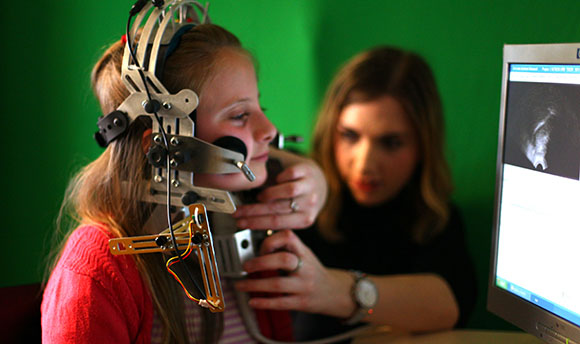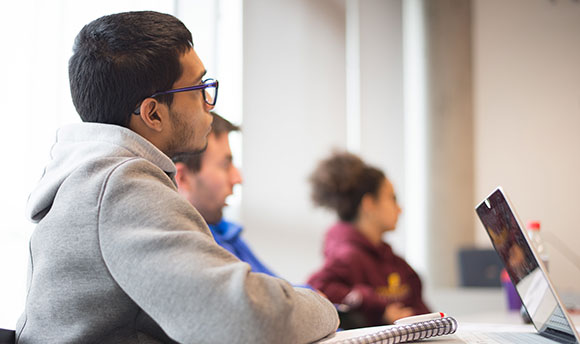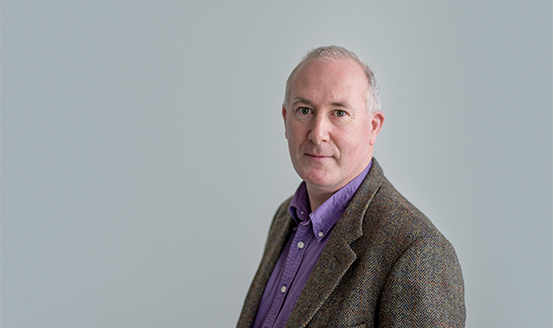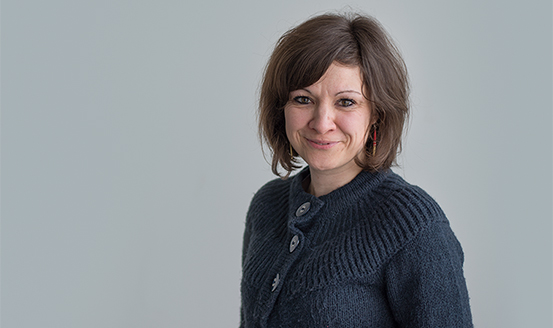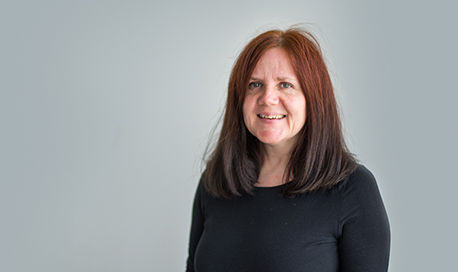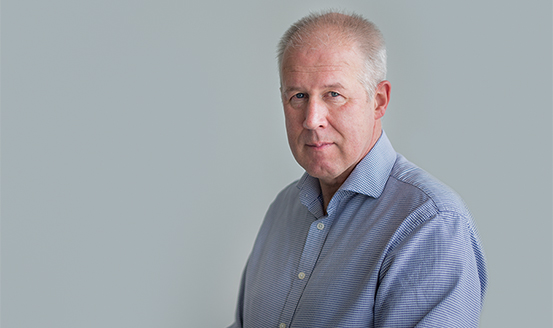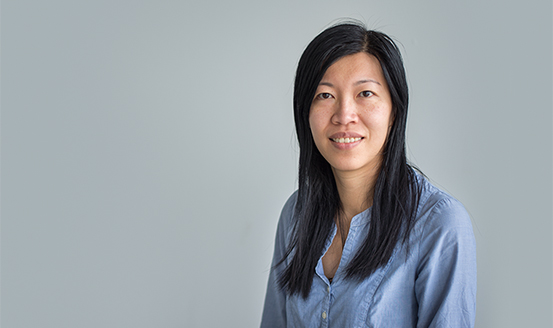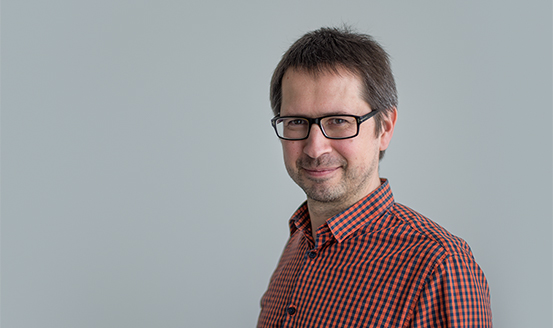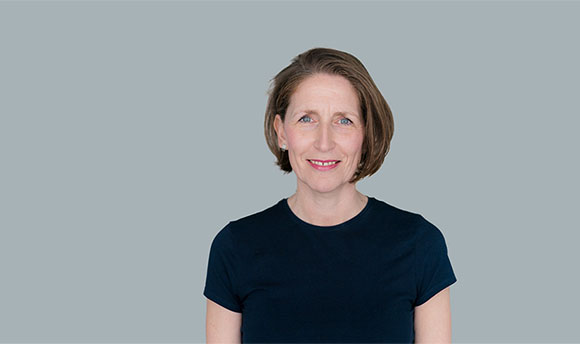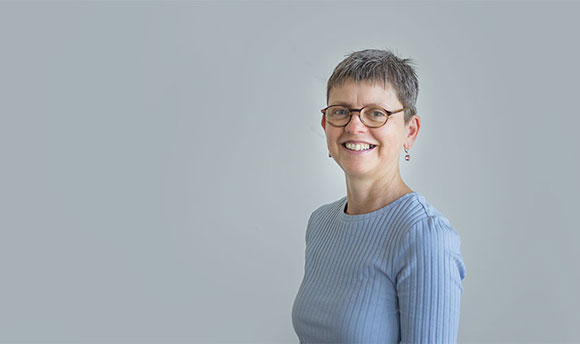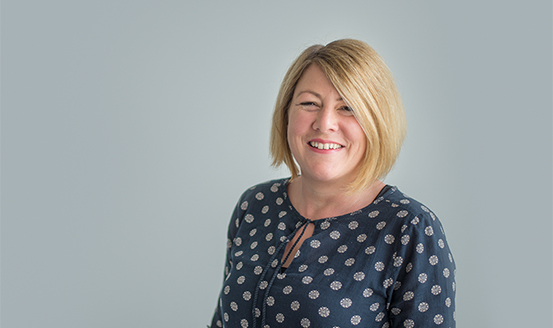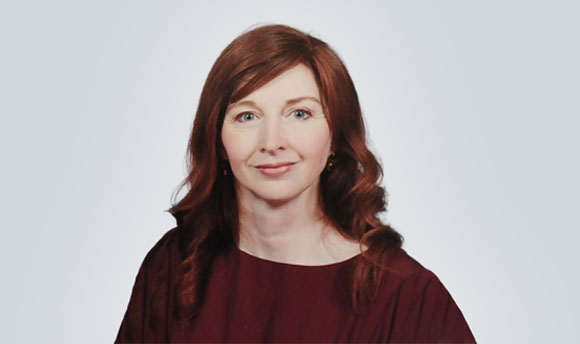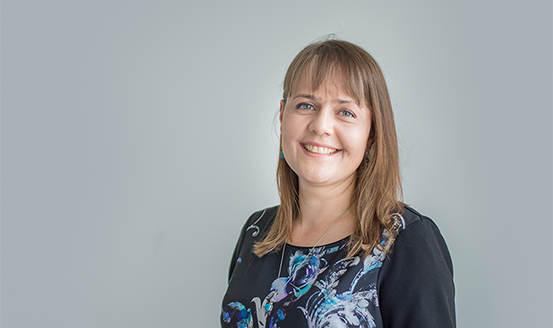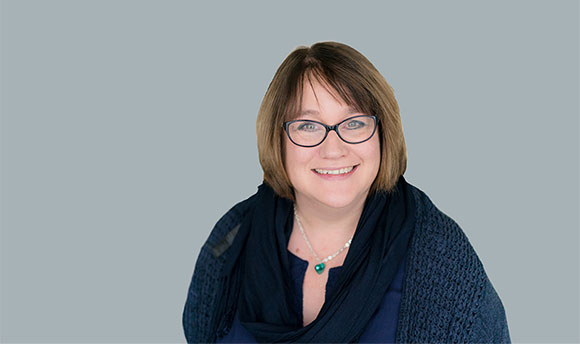
Clinical Audiology, Speech and Language Research Centre (CASL)
In the Clinical Audiology, Speech and Language Research Centre (CASL) we explore speech, language, hearing, signing and swallowing by undertaking empirical and theoretical research into the rich and complex patterns of social, physiological and developmental variation in typical and clinical populations.
We develop new assessments, techniques and treatments for the Speech and Language Therapists and Audiologists of the future.
We also highlight the important role all forms of communication play in society.
Ultimately, the multidisciplinary work of the CASL aims to improve the lives of both children and adults locally, nationally and internationally.
Our core remit is the study of clinical communication disorders, yet our research strategy crucially draws on and contributes to a far wider range of topics.
Our research is multidisciplinary in order to explore all aspects of communication and ranges from applied to blue-skies.
We disseminate outcomes and findings from our research in high-quality publications and through public engagement.
We regularly attract substantial support from public funding bodies and charities in order to conduct world-leading innovative research.
Our methodological research focuses on the development of new and enhanced instrumentation, analytic techniques and experimental methods for the collection, measurement and analysis of speech and swallowing.
Our applied research focuses on the diagnosis, treatment and modelling of speech, language, hearing and swallowing disorders. We are particularly interested in the effective use of visual biofeedback in therapy and the role of genetic, social and educational factors in linguistic deficits.
Our theoretical research covers work on speech production processes, speech disorders, child language acquisition, sociolinguistics, intra- and inter-individual variation, psycholinguistics, and phonology.
Current Research and KE Groups:
- Accent Variation in Scotland
- Advancing Audiology in Research and Clinical Practice
- Dysfluency
- Meeting Unmet Speech, Language and Communication Needs
- National Autism Implementation Team (NAIT)
- Ultrasound Evaluation of Swallowing
- Ultrasound Tongue Imaging for Speech Research
- Visual Feedback for Speech and Language Therapy
- Voice Analysis, Attribution and Care
- Working with Sign Language Users and Interpreters
Completed projects:
- An Edinburgh Speech Production Facility (ESRC)
- Articulatory Settings in Bilingual Speakers (ESRC)
- Child co-articulation and Preadolescent co-articulation (ESRC)
- EPG Downs Syndrome (Nuffield)
- FitVoice (QMU Innovation Fellowship)
- Phonetic and Phonological Systems Analysis (PPSA)
- Speech Variation and Their Impact on Listener Comprehension and Attention (ESRC)
- Ultraphonix (EPSRC and CSO)
Our research is intended to be useful and relevant to those who can benefit from it.
For example:
- people with a variety of clinical communication disorders and needs
- people with a variety of related physiological and neurological disorders and needs
- speech and language therapists and audiologists
- policymakers concerned with the role of communication for wellbeing, participation and education
- academics and students across the world
- members of the public interested in speech and language variation
In order for our research to have a positive impact on these groups, we pursue collaborations, training and joint projects in partnership with NHS, third-sector and industry colleagues.
To help educate the next generation of therapists, we have taken a key role in developing teaching websites featuring extensive collections of instrumental and acoustic recordings of speech (Seeing Speech and Dynamic Dialects). Clinical data from our research projects on articulation and swallowing provide a unique resource for student and clinician training.
Our CASL PhD students make a vital contribution to the Centre's work and research culture.
Regular group mentoring sessions with the CASL directors and other QMU researchers (the PhD CASL Culture Club) reflect our desire to nourish a collaborative, multidisciplinary approach to research at all levels.
More recently, CASL PhD students working on speech-related topics have taken peer-mentoring to the next level and founded PhDnetics, a Scottish-wide network of doctoral and early career researchers in phonetics.
Current PhD students:
- Danah Alqattan
- Irina Brodskaia
- Gemma Cartney
- Janet Coulson
- Hala El Kachtoul
- Ciera Haggar
- Taz Hockaday
- Stephen Jannetts
- Victoria Johnstone-Cooke
- Susie Lloyd
- AnneMarie MacRae
- Gaby Quezada
Former PhD students:
- Dr Wael Al-Dakroury (Alfaisal, Saudi Arabia)
- Dr Lianne Carroll
- Prof Joanne Cleland (Strathclyde)
- Dr Wendy Cohen (Strathclyde)
- Dr Louise Cotton
- Dr Maria Dokovova (Strathclyde)
- Dr Esther DeLeeuw (Lausanne, France)
- Dr Christine DePlacido (QMU)
- Dr Lucy Ellis
- Dr Olga Gordeeva (Industry)
- Dr Cornelia Heyde (Industry)
- Dr Ian Finlayson (industry)
- Dr Dermot Fitzsimons (Clinician / Strathclyde)
- Dr Susanne Fuchs (ZAS Berlin, Germany)
- Dr Ioulia Grichkovtsova (Caen, France)
- Dr Ann Hodson (QMU)
- Dr Christine Johnson (QMU)
- Dr Helen Kelly (Cork)
- Dr Tanya Kocjančič Antolík (Charles University Prague, Czech Republic)
- Dr Leila Mackie (Clinician)
- Dr Catherine Mayo (Industry)
- Dr Ben Matthews (L-Università ta' Malta)
- Dr Amy Meikle (Clinician)
- Dr Erin Miley (Industry)
- Dr Mridhula Murali (Strathclyde)
- Dr Pertti Palo (Indiana University, USA)
- Dr Siobhan Mack (QMU)
- Dr Robert Mullally (Industry)
- Dr Lizanne Steenkamp (QMU)
- Dr Claire Timmins (Strathclyde)
- Dr Rebecca Rodger
- Dr Zoe Roxburgh (Clinician)
- Dr Robert Rush (QMU)
- Dr Jocelynne Watson (QMU)
- Dr Ann Walton (Clinician)
- Dr Daphne Waters (QMU)
- Dr Anna Womack (Clinician)
- Dr Sara Wood (QMU)
- Dr Natasha Zharkova (Industry)
Useful Links:
Graduate School for doctoral research
eTHESES for recent PhD and Professional Doctorate dissertations
Postgraduate taught study & clinical qualifications
eTHESES for recent MSc dissertations in Speech & Language Therapy and Audiology.
Collaborative projects:
- Seeing Speech (with Glasgow University and Strathclyde University)
- Dynamic Dialects (with Glasgow University and Strathclyde University)
- PlanArt: Planning the Articulation of Spoken Utterances (with Edinburgh University)
Current research visitors:
- Dr Sonja Dahlgren (University of Helsinki, Finland)
- Dr Malin Svensson Lundmark (University of Lund, Sweden)
Previous research visitors and funded postdocs:
- Dr Maria Paola Bissiri
- Dr Eleanor Lawson
- Dr Marko Liker
- Dr Mai Ohkubo
- Dr Patrycja Strycharczuk
CASL has a positive commercial impact, both within the UK and internationally, through its partnership with Articulate Instruments Ltd.
The company, led by Professor Alan Wrench, supports CASL’s research vision by inventing speech instruments, and developing and supporting software for speech analysis and visual biofeedback therapy. Their world-leading products are used in over 150 phonetics laboratories for research.
Other notable commercialisation activities have focussed on the analysis and treatment of the voice, another longstanding area of research excellence at CASL.
Fitvoice CIC offers a technology-enabled, smartphone-assisted voice care service for occupational voice users who rely on their voice for their work, e.g. teachers, lecturers, actors or fitness instructors.
The Voice Distillery provides services for voiceover artists and the industries who commission their work.
Voicebuddy is a clinically informed web app dedicated to improving voice health.

